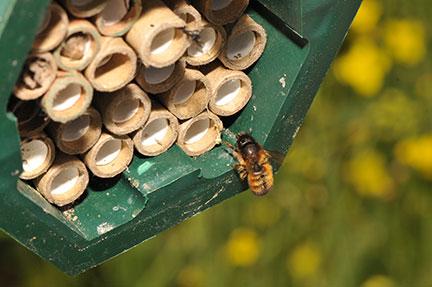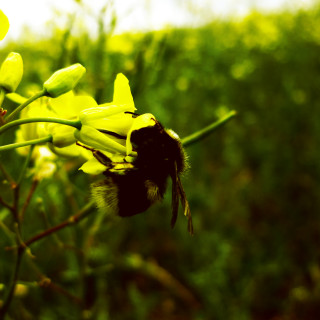Wild bees are harmed by pesticide
A research project has, for the first time, investigated how a neonicotinoid pesticide, clothianidin, affects both honeybees and wild bees under field conditions in agricultural landscapes. The study shows that honeybees can cope with exposure to the pesticide, but that it has a strong negative impact on wild bees.
Neonicotinoids are used for coating rapeseed, to protect the young plants against flea beetles. Since 2013, use of three neonicotinoids has been restricted by the EU for seed coating in crops that are attractive to bees. The researchers, from Lund University and Swedish University of Agricultural Sciences, in collaboration with the Swedish Board of Agriculture, have investigated how the neonicotinoid clothianidin affects domesticated and wild bees under Swedish field conditions.
The research findings has been published in the scientific journal Nature, and they show that the insecticide has a negative impact on wild bees. This is severe, because wild bees play an important role in pollination of crops. Wild bees are in Sweden bumblebees and solitary bees.
“We saw a clear negative impact on growth and reproduction in bumblebee colonies near treated oilseed rape fields”, said Maj Rundlöf from Lund University, the coordinator and principal investigator for the field study.
As well as problems with growth and reproduction, there were also fewer wild bees in the treated oilseed rape fields. However, the researchers found no negative effect on colony growth of honeybees.
The study demonstrates the need for new approaches to evaluate environmental risks when pesticides are approved for use.
“If we only investigate how a new pesticide affects honeybees, that is not sufficient to predict the consequences for wild bees in real landscapes”, said Maj Rundlöf.
“My interpretation of the results is that it is inappropriate to use clothianidin on rapeseed”, said Thorsten Rahbek Pedersen, project manager at the Swedish Board of Agriculture. “We need alternative pesticides and new cultivation methods if we are to continue growing spring oilseed rape in Sweden.”
“We are testing new methods of dealing with flea beetles”, said Riccardo Bommarco from the Swedish University of Agricultural Sciences.
The project has been carried out in collaboration with the Swedish Seed and Oilseed Growers Association and beekeeping organisations.



